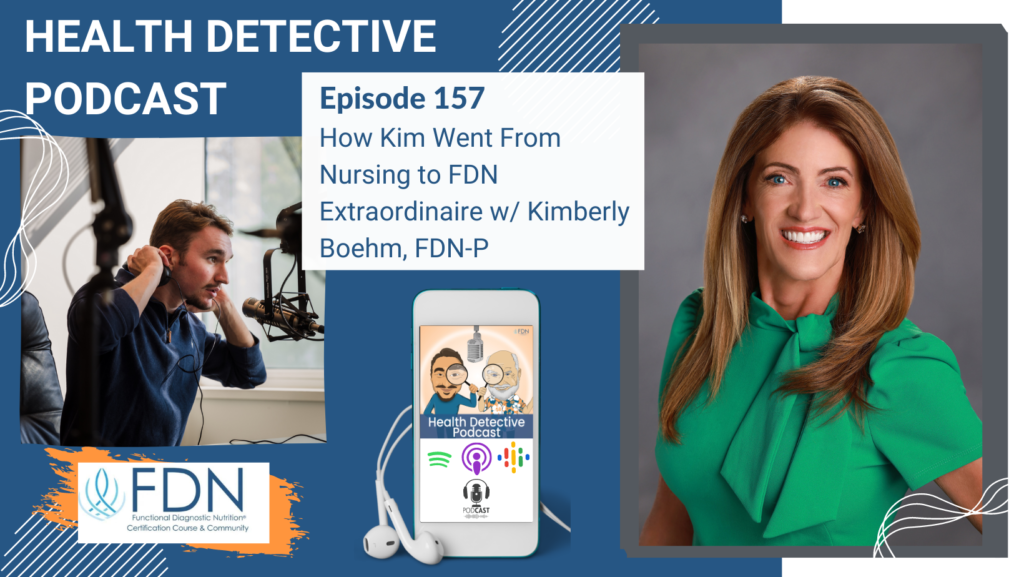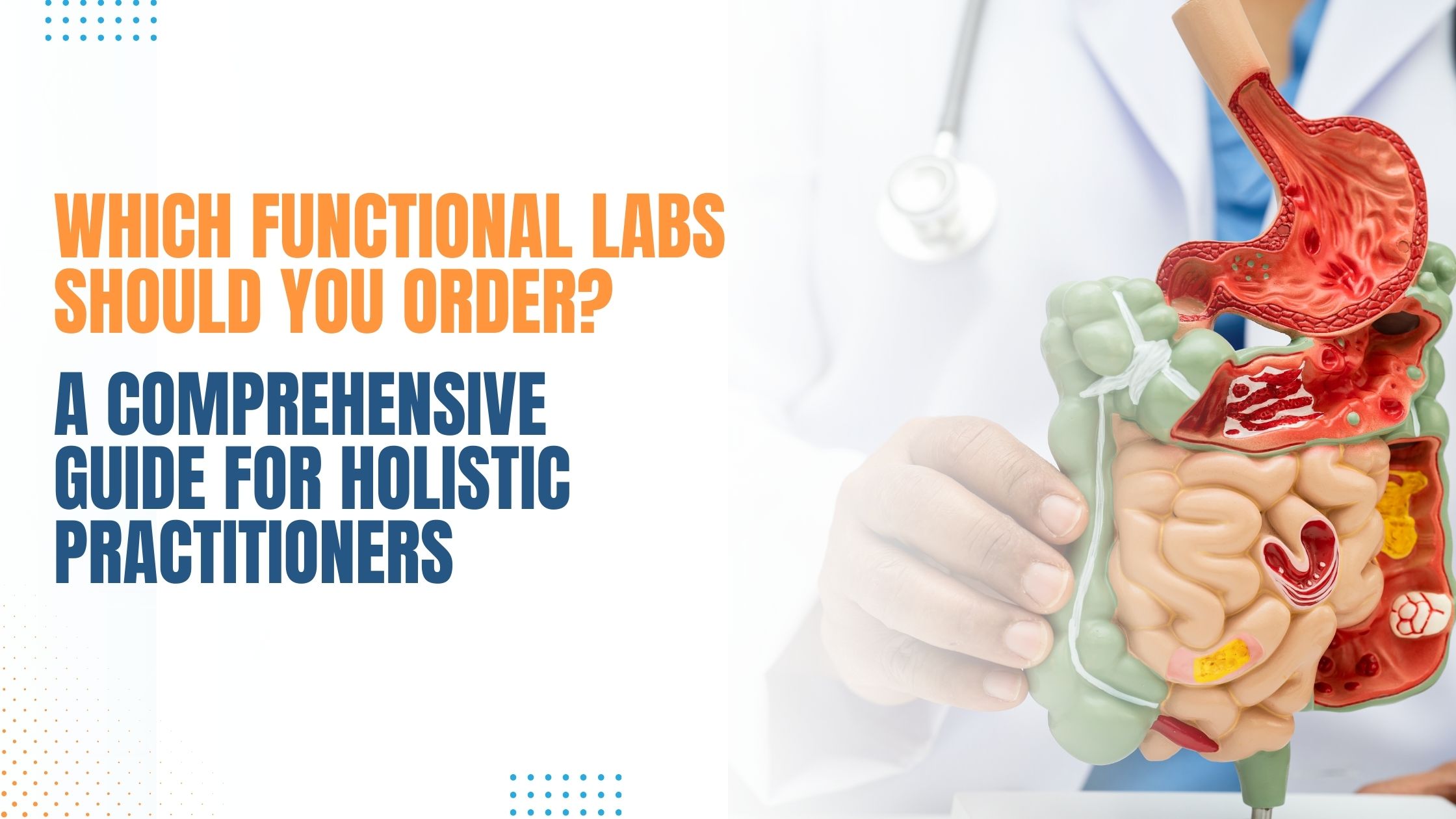Introduction
[00:00:00] Detective Ev: Hello, and welcome to the Health Detective Podcast by Functional Diagnostic Nutrition. We bring you interviews from people who have conquered the trickiest of health challenges using the Functional Diagnostic Nutrition philosophy and similar healing modalities. Here is today’s episode about a career transformation from nursing to a successful FDN Practitioner business.
Hey, Kimberly, how are you?
Kimberly Boehm: I’m great. How are you Ev?
Detective Ev: I’m doing well.
We’re doing the first live Health Detective Podcast interview. We’re talking to my friend Kim today. We got to meet for the first time in person at a Biohacking Congress. It was a conference that we went to for FDN recently. This is one sharp cookie.

Little different than some of the other podcasts in that, Kim wasn’t walking around with cancer or autoimmunity, but she certainly has some good things to say. Definitely has a background, which I think you guys will find very relevant to what we’re talking about today.
Kim, welcome to the Health Detective Podcast. Thanks for being here.
[00:01:02] Kimberly Boehm: Thanks so much. I’m excited. I feel like I’ve actually hit the big time now. I listened to your show and it’s like, I’ve been on a lot of really cold ones, but I wanted to be on yours for a long time. So, thanks for having me.
[00:01:11] Detective Ev: Awesome. Well, we are glad to have you.
Where Interest in Nursing Piqued From
Since my normal first question is like, when did someone’s health symptoms start and what did they look like? I’ll take a slightly different approach here and I’ll ask, how did you end up getting into nursing? I know we haven’t mentioned that yet, but I know Kim’s background.
You had other things going on before you even got into that. I’m just curious, tell us a little bit about your adult life and then how that eventually led to changing careers to nursing.
[00:01:35] Kimberly Boehm: Oh, wow. Well, for me, I actually owned a telephone company. We installed very large phone systems into hospitals and retirement communities all over the country.
When I was 48, I had an opportunity to sell that company after 20 years and I took it. Did a little bit of traveling. After a while all your friends and family, they were all at work, so you don’t really have anybody to play with. I thought, you know what? I really wanna go back and do something else.
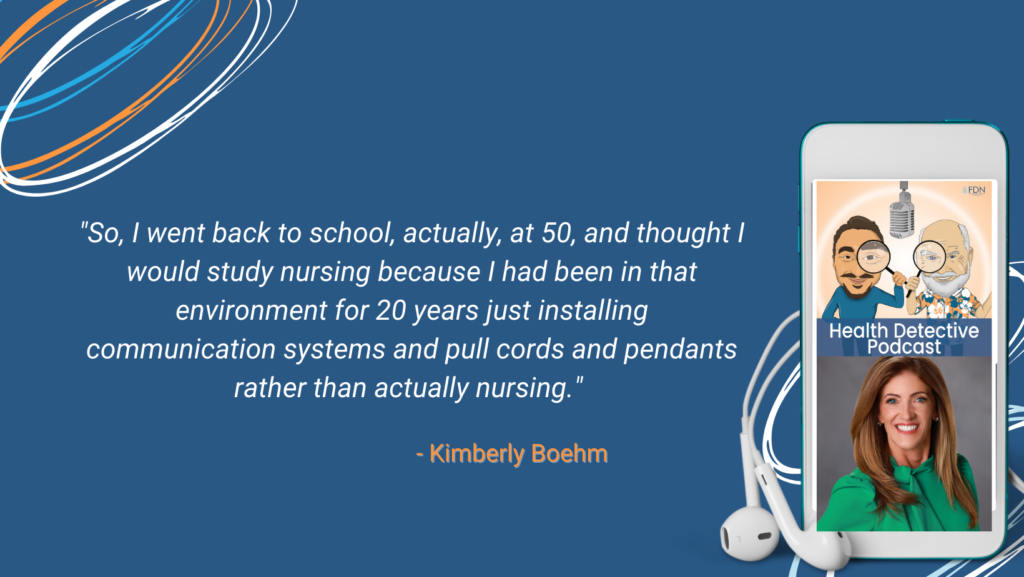
So, I went back to school, actually, at 50, and thought I would study nursing because I had been in that environment for 20 years just installing communication systems and pull cords and pendants rather than actually nursing. That’s kind of where the interest was piqued.
[00:02:16] Detective Ev: I thought it was so cool when I heard about all these like different careers and having success in all of them. That’s what’s really interesting. I feel like one of the ways that you’ve gotten so much attention at FDN is because you came right out of the gates, you were doing the business stuff. You’re doing the things that we try to teach people, but you can’t force anyone into it.
Not a Complete System of Care
Then, go figure, I found out that you have this business background. It gives you that extra push and we’ll talk about that later. Sometimes people just have to have the guts to go out and actually do this.
When you were in this nursing career, you were probably helping people doing great things. You told me, eventually, you started to realize that maybe this wasn’t a complete system of care. What were some of the things going on that made you rethink what you were doing?
[00:02:57] Kimberly Boehm: You’re right about that. First of all, let me say that I was very blessed to work with some of the most wonderful, thorough, loving, caring doctors and nurses and nurse practitioners that I’ve ever met. They were excellent at what they did. They cared.
But here’s the thing, you realize that, once you get into the system, that the doctor is not the boss. A lot of people think that, well, the doctor’s the boss, the doctor’s not a boss. The doctor is a paid employee, just like the receptionist is a paid employee. There is a hierarchy in a large group. There’s a practice manager who is in charge of the doctor basically. Then he, or she has their own hierarchy up the chain.
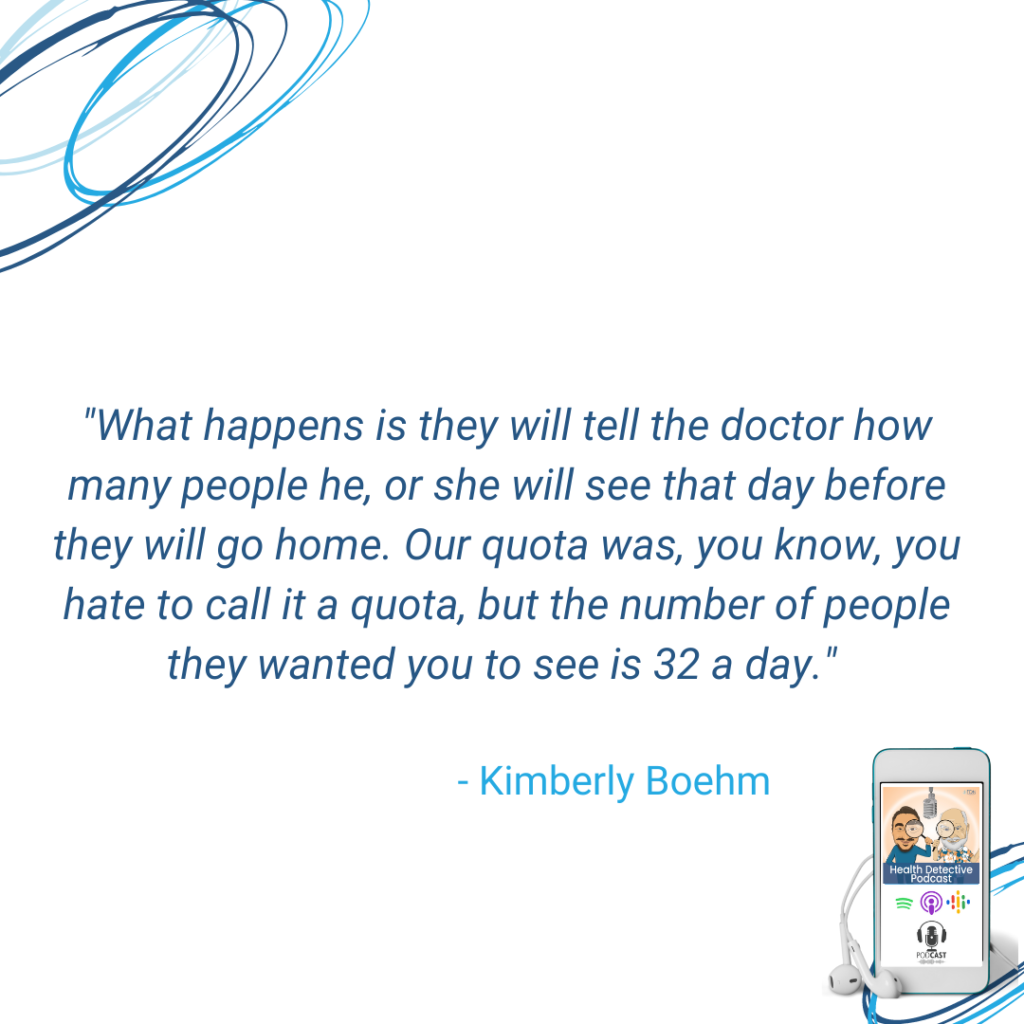
What happens is they will tell the doctor how many people he, or she will see that day before they will go home. Our quota was, you know, you hate to call it a quota, but the number of people they wanted you to see is 32 a day. For us, that was someone every 15 minutes.
A Quick Visit and a Shallow Send-Off
As a nurse, you get the opportunity to go in before the doctor. You get the history of the present illness, you get what medication, you get vital signs. That’s a few minutes. Then the doctor would take my notes and go in and try to really understand what I said, and the patient said, and lay hands on, you know, physically look, diagnose. But it was 15 minutes.
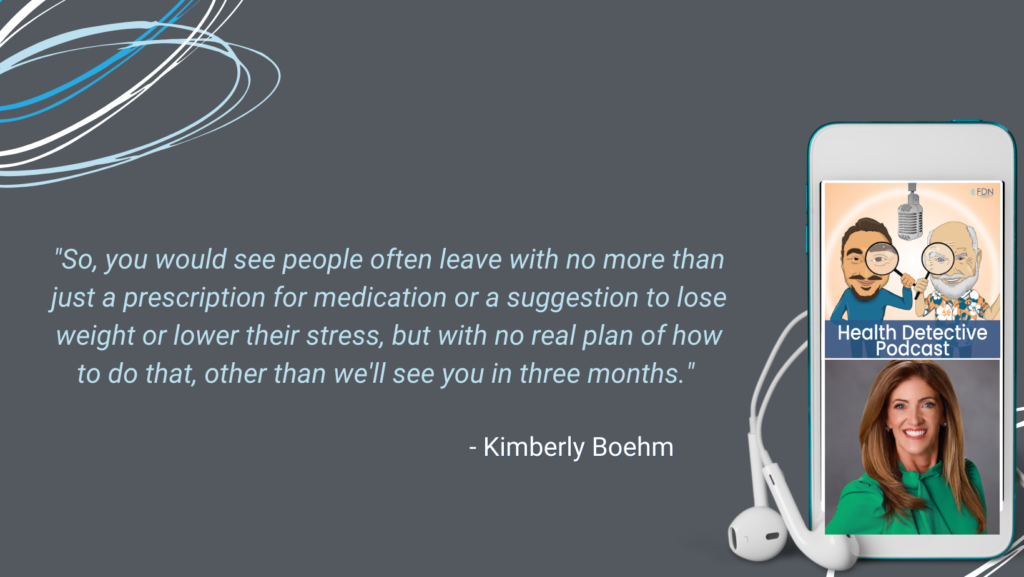
So, you would see people often leave with no more than just a prescription for medication or a suggestion to lose weight or lower their stress, but with no real plan of how to do that, other than we’ll see you in three months. Come back and let’s give it another go.
That for me was eye opening. Because I would see people come back just after having been in that (we talk about it in FDN all the time), cycle of trial and error. Or they would come in, oh, your labs are normal.
I don’t know. You really need to go to gastro. If you go to gastro, well, your labs are normal. Maybe endocrinology. And I was working with some of the best of the best. But it’s just an interesting system once you see it maybe from a different angle.
[00:05:07] Detective Ev: We wanted to do this live with someone who just came into FDN and is absolutely kicking butt. Doing the things that we try to get everyone to do and is having real success with this and has actually already spoken for FDN at a conference. Did a great job there.
So again, a background in business, but also then nursing for a good amount of time. Then kind of saw what so many people saw, the holes in the system.
Don’t Play the Blame Game
This is actually something I always mention on all of the podcasts, Kim, but it’s especially important today because (you said nothing like this, but people always misinterpret these things, especially if I say it as someone who wasn’t in Western medicine), guys, we have so many people in FDN that are from Western medicine or a part of it still. This is not a condemnation of anything. Has nothing to do with anything like that. That’s not what this is about.
But it’s an incomplete system for the many of us who have chronic health issues, whether it’s by seeing it in your patients or feeling it ourselves. It’s an expert in acute illness. Acute illness, accidents, you break your arm. Yes. I’m going to the emergency room. That’s a great thing to do.
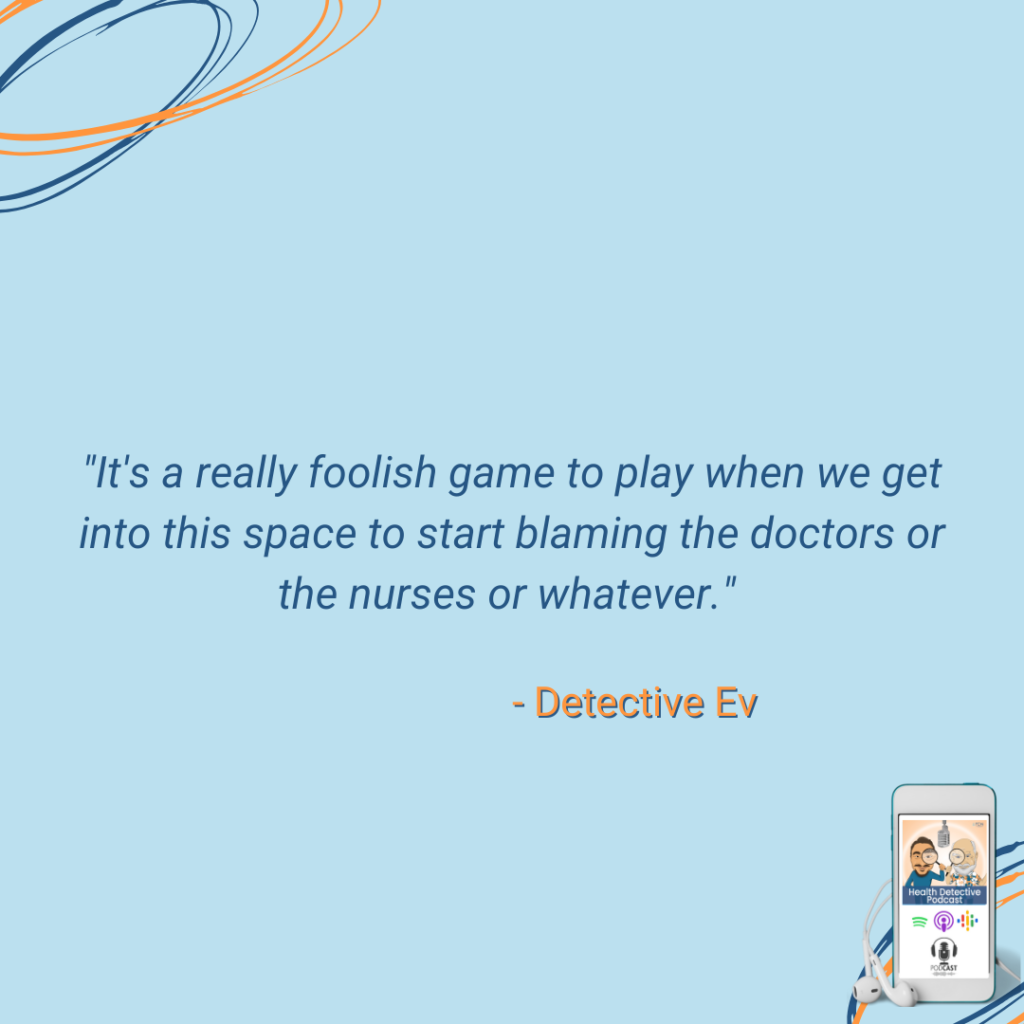
It’s a really foolish game to play when we get into this space to start blaming the doctors or the nurses or whatever. It’s just like you said, they’re not the boss, they’re in this same system that we’re all in.
I remember going to a family practice local to me. (I shared this story before.) It was where my mom went. My mom had her thyroid removed and as I’m learning more, I realized that probably never needed to happen. I was very upset about this. I was like an 18, 19-year-old guy.
I was pissed off, honestly. I’m like, how could they do this to my mom? I remember wanting to go down there. I had like, these studies memorized and stuff, Kim. I was ready to tell this doctor off. I was just looking for a problem, honestly. I was upset and I was looking for a problem. It was immature.
The Problem is The System
I walked in and it’s a family practice, there’s multiple doctors. I got a doctor whose name, of course, I will not mention out of respect, but it was someone who I had never had before. Kim, this guy walks in, no exaggeration, pale as can be, probably 70 to a hundred pounds overweight, and I’m bad at estimating that, it might have been more.
I was instantly humbled, as I realized, he’s not sitting on the fountain of youth back in his office and screwing over my family. I wish it was that simple so that I can point the finger there. This goes so much deeper and is so much bigger than that stuff.
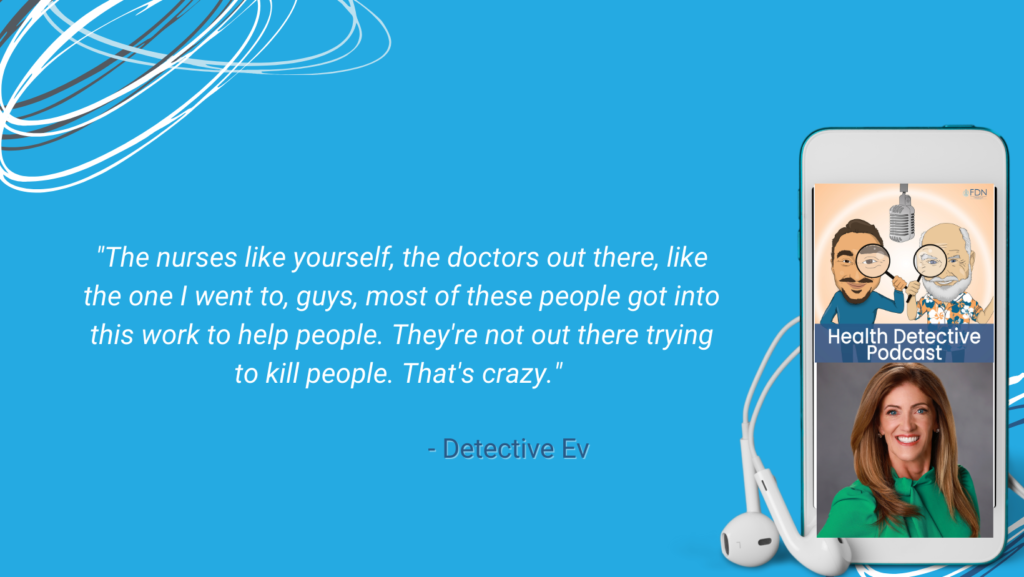
The nurses like yourself, the doctors out there, like the one I went to, guys, most of these people got into this work to help people. They’re not out there trying to kill people. That’s crazy. That’s not what’s happening at all.
[00:07:18] Kimberly Boehm: Oh, you’re so right about that. Then you add on top of that, the number of people you’ll see a day as the number of topics that you will discuss with this person today, because that’s what’s going to get that super bill to be the largest it can be. So, even if you come in with just a sore throat or a cold it’s going to be, well, gee, how’s your blood pressure. How’s this? Because you’ve gotta be able to put the checks in the box.
So, my problem is with the system not with the doctors or the nurses.
Part of the Problem
Because that’s usually not the type of practice that they were envisioning as they were spending eight years of their life in school and education and dreaming about the people that they would help. You know, or which medication are you allowed to prescribe to go with this particular code. And if it doesn’t go with that code, they don’t get to have it or they have to pay out of pocket and then who can afford to do that. It’s really just an interesting system.
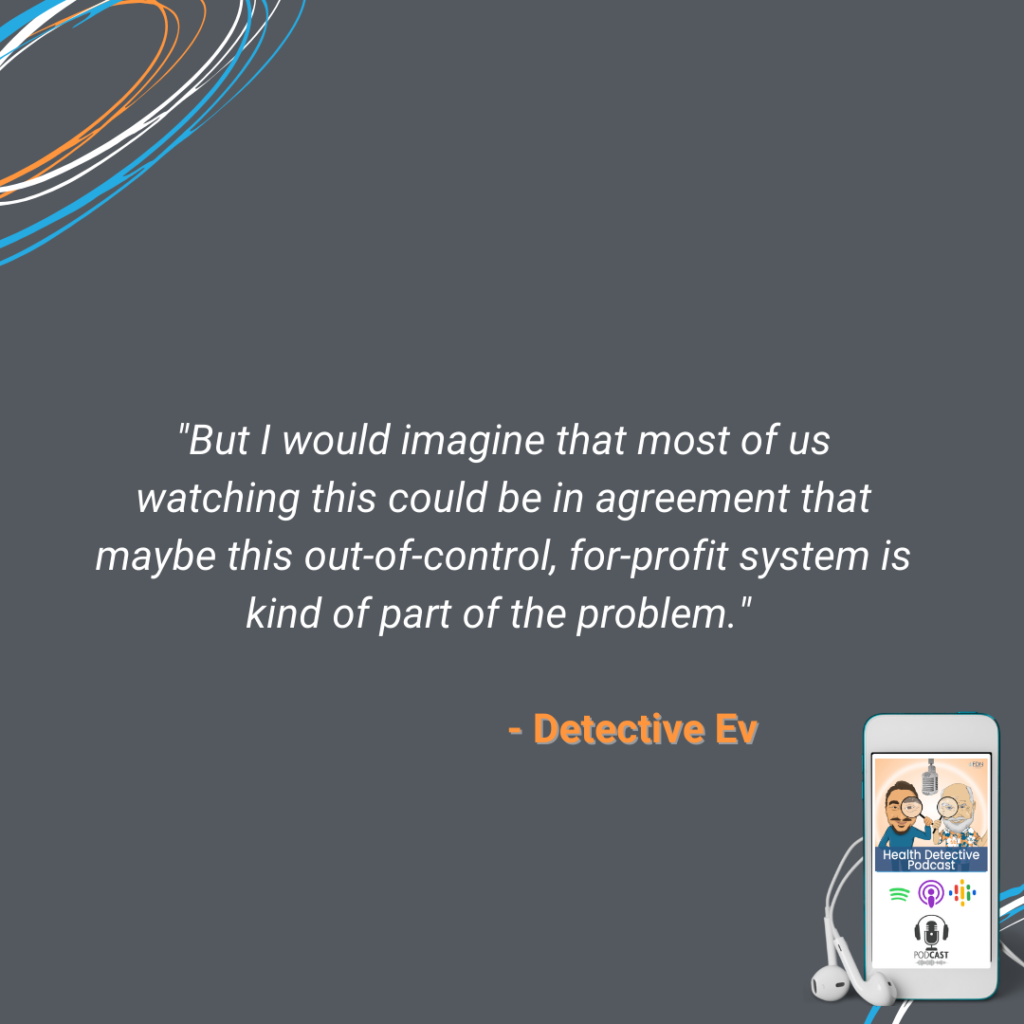
[00:08:12] Detective Ev: It’s tough because you know, I’m a younger guy. I’m still trying to figure out like my political philosophy and stuff. I would never make a statement either way on here. But I would imagine that most of us watching this could be in agreement that maybe this out-of-control, for-profit system is kind of part of the problem. I’m not sure. I’m like, hey, that breeds innovation. Right?
But there does seem something a little risky about a pharmaceutical rep being (and this is a true story), able to influence the small diner my family used to own. Or I’m sorry, doctors using my family’s small diner by buying them a hundred dollars’ worth of lunch every single week for over eight years straight. We had added it up and they had spent about probably close to $40,000 over the entire time that that business was open. And this is legal.
From Nursing to Pursuing a Natural Functional Route
[00:08:54] Kimberly Boehm: It’s absolutely legal, happened every day. When I say every day, every single day. There was a book at the front desk and drug reps come in, just ask for the book, and they pick their day. But every single day we had lunch brought in whether it was Olive Garden or Applebee’s or Chick-Fil-A. Yeah, every single day that happens.
[00:09:10] Detective Ev: So again, I’m not big on controlling things, but I think if I was president, I might change the ability to do something like that. Seems a little scary.
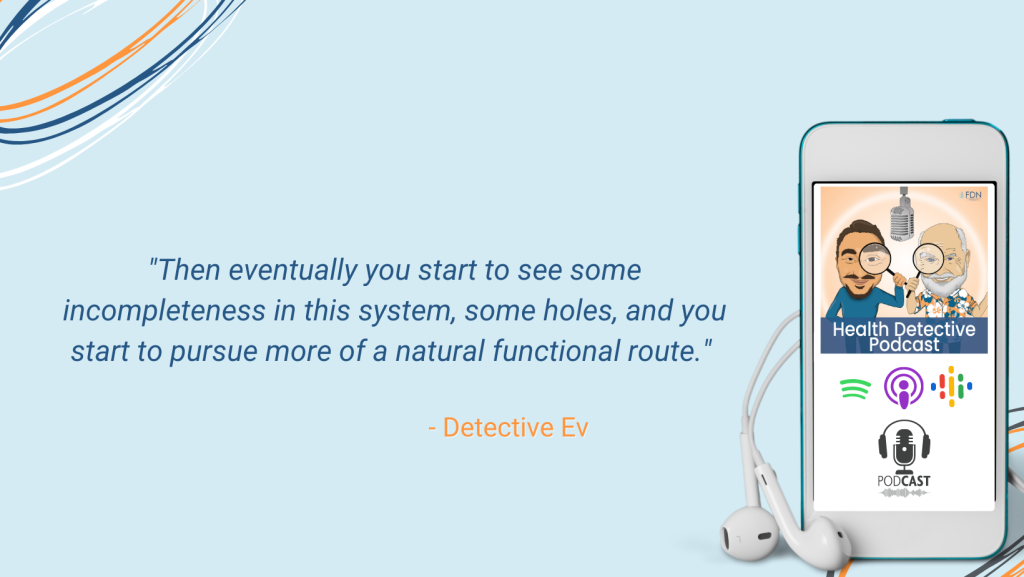
So, Kim, you owned this business, doing well, kicking butt. Get into nursing, helping people, going back to school. Amazing! Then eventually you start to see some incompleteness in this system, some holes, and you start to pursue more of a natural functional route.
What was the moment, if there was one? Sometimes there is for people where you’re like, I need to go do something else. Cause it’s one thing to see something for a few years. It’s another to be like, I need to go find something like FDN. That’s a big transition from working wherever to being an FDN, in my opinion.
Drama Didn’t Push Kim from Nursing to FDN
[00:09:49] Kimberly Boehm: Well, I will say that I didn’t leave nursing after the years I spent there, and it was, oh, I guess going on six years there. I didn’t leave nursing because one particular thing happened that left me feeling like that was the last straw. So, it wasn’t that. I saw doctors and nurses trying their best every day to help people.
But then I also saw people who ended up having weight loss surgeries and things that were supposed to be helpful that ended up not being helpful. Where they may have lost some weight initially, but it would’ve just been so much of a safer option to lose it naturally, to understand what is their metabolic type, what is your food sensitivities, you know, water, exercise, all those things that we talk about every day. But you don’t give them a plan for how to do that. You give them a plan for which medicine to take.
Same with back surgery. Back surgery is either the best thing or the worst thing somebody ever did. They’ll either say, oh, that was wonderful. Or, oh my goodness, I’ve never been the same since. I just knew there had to be something different.
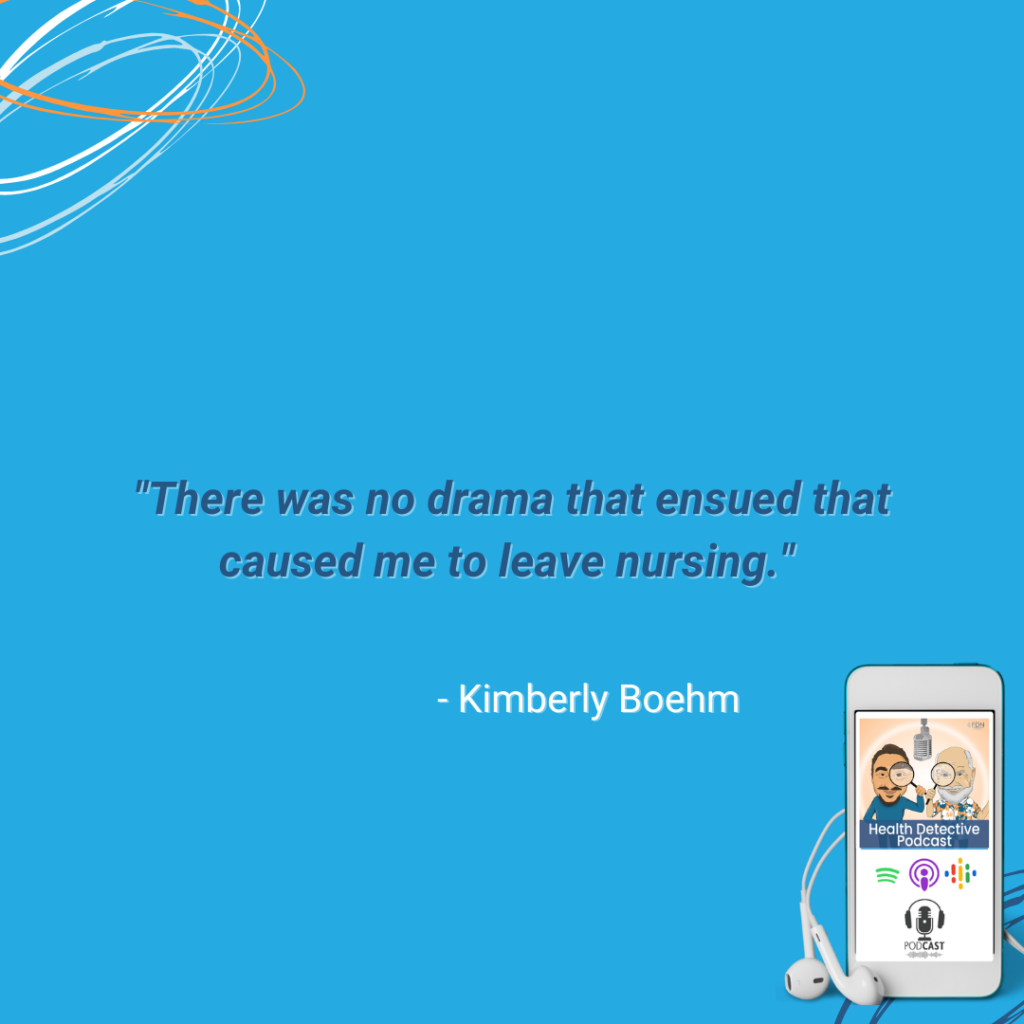
There was no drama that ensued that caused me to leave nursing. But I did have a passion to want to continue to do something. For me, I really enjoyed that part of the nursing, which was going in and sitting with someone and trying to understand what’s going on.
Medical Care is a Business
What’s your life look like? What’s your diet look like? What are you doing? But you know, there’s not that kind of time. You have to move on, there are people in the waiting room. And you know, I have to admit, I’m one of those too, where if I’ve got an appointment at 12:30 and you don’t see me till, 1:45, you know, I don’t like that.
But in the same sense, you know, the doctor, you want that personal service and there was not always time to give it, if you were gonna have any life of your own and get home and see your own kids play ball. I mean, you had to get in and out.
[00:11:25] Detective Ev: I still keep going back to that quota thing. Again, I’m very careful about acting like, oh, I know what to do, or I’d make these rules. But something just tells me that the idea of like, I know quota’s not the exact word, you did specify that, but just even having a required number of anything when it involves people that are sick or ill, that just doesn’t seem like a good recipe for health. You know, some people require time.
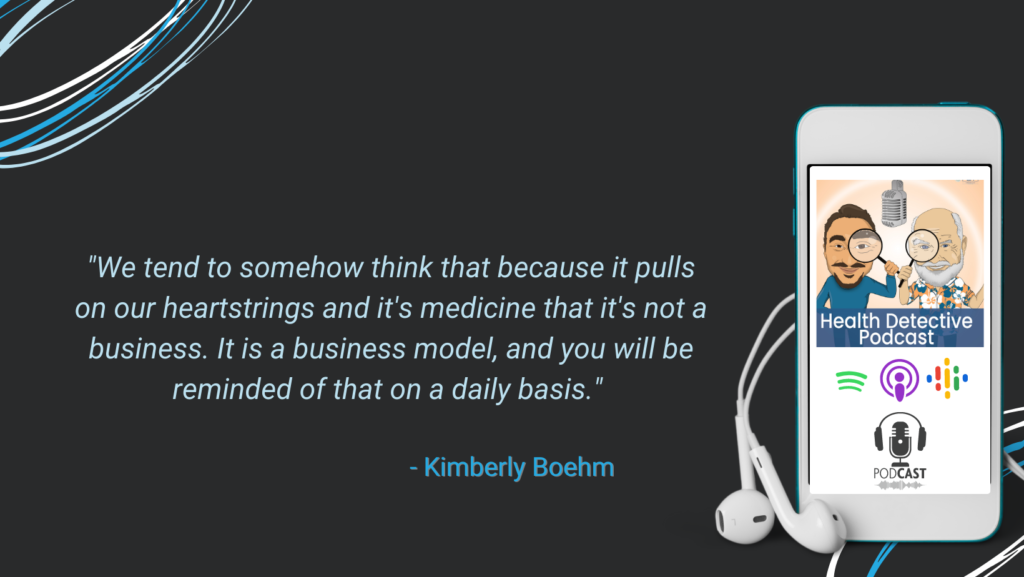
[00:11:48] Kimberly Boehm: But you have to understand, what’s the goal? They’re not a, not for profit company. You know. I mean, their goal is that of any business, which is to serve people, yes. And do it as best you can. But profitability is a really big part of any business. We tend to somehow think that because it pulls on our heartstrings and it’s medicine that it’s not a business. It is a business model, and you will be reminded of that on a daily basis.
Back to School from Nursing
[00:12:15] Detective Ev: Well, that’s well said. Yeah, it does pull my heartstrings and that’s why it causes this cognitive dissonance cause I try to be logical with it.
I clearly have a bias towards this because of what happened to me in the Western medicine world and my family. But again, we’re not here to necessarily fix that system, we’re here promoting good stuff. So, I’ll do just that.
So, how did you find FDN? If we did discuss it, I forget. How did you find us?
[00:12:36] Kimberly Boehm: This is an interesting story. I wanted to be a health coach because I thought, you know, that’s right up my alley. I love talking to patients. I love talking to people. This is something I can do. I understand medication.
And we prefaced this whole talk with, you don’t have to be a nurse. Most of the people in the program are not doctors or nurses. They are normal people who have a fitness background, a health background, a desire to help people.
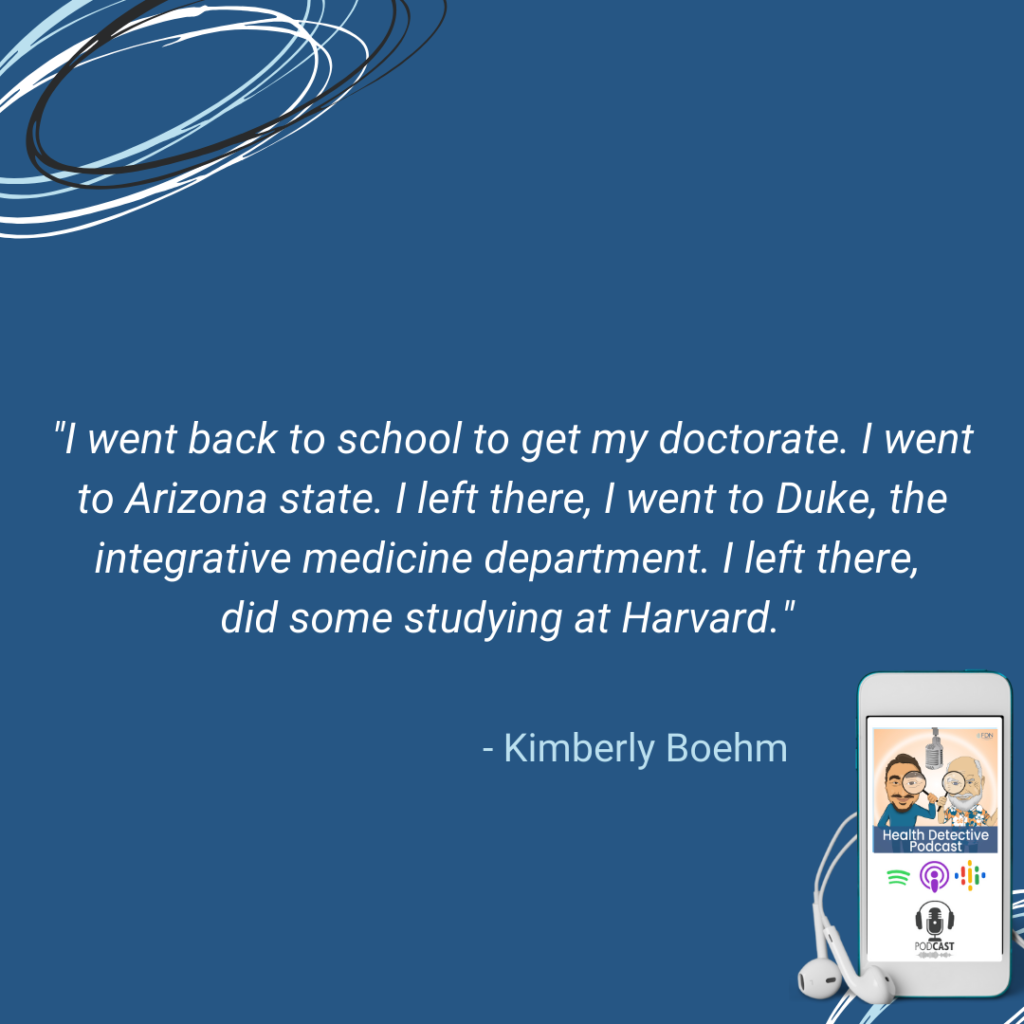
But that just happened to be mine. So, I thought, wow, that’s right up my alley. I’m gonna do that. I went back to school to get my doctorate. I went to Arizona state. I left there, I went to Duke, the integrative medicine department. I left there, did some studying at Harvard.
So, I felt like when it was time for me to hang out my shingle, that I was so ready. I had this model for sustainable change from arguably some of the smartest people at Duke that know change has to happen a certain way. It has to lay down a certain way in the brain for it to be sustainable.
Clients Aren’t Getting Well
I just knew I was going to crush it. But what happened was not that. I got my first few clients, and it was interesting because they were working my program to the T. We got to the end of the program, and I’ll never forget the first lady. She was still unwell, and I was disappointed. You know, she was disappointed.
I’ll never forget. She said to me, you know, maybe this is as good as I’m ever going to feel. I just thought, oh, something’s wrong. Then I had my next client and my next one. Finally, I realized something’s not right. I went back to Duke; I got an advanced degree in health coaching.
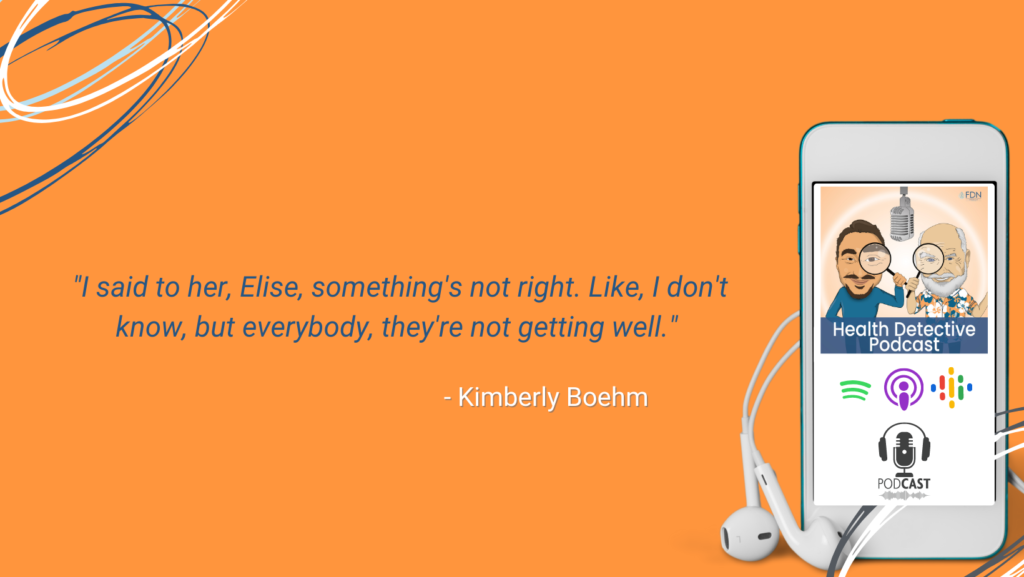
You know, we had little groups of people, we had cohorts. We had people listening in on the talks. And I’ll never forget, one of the girls in my cohort, her name was Elise Morgan. I said to her, Elise, something’s not right. Like, I don’t know, but everybody, they’re not getting well. She said to me, she said, well, you know, this health coaching is great, but that’s not my first line of business. I’m an FDN practitioner.
I said, you’re a what? She said, yeah, I’m an FDN practitioner. We’re like health detectives. We look for the cause of things. You know, and I’m over here devastated, thinking that my business is dying and I’m not helping people. I’ll send you a link is what she said.
FDN, the Missing Piece from Nursing
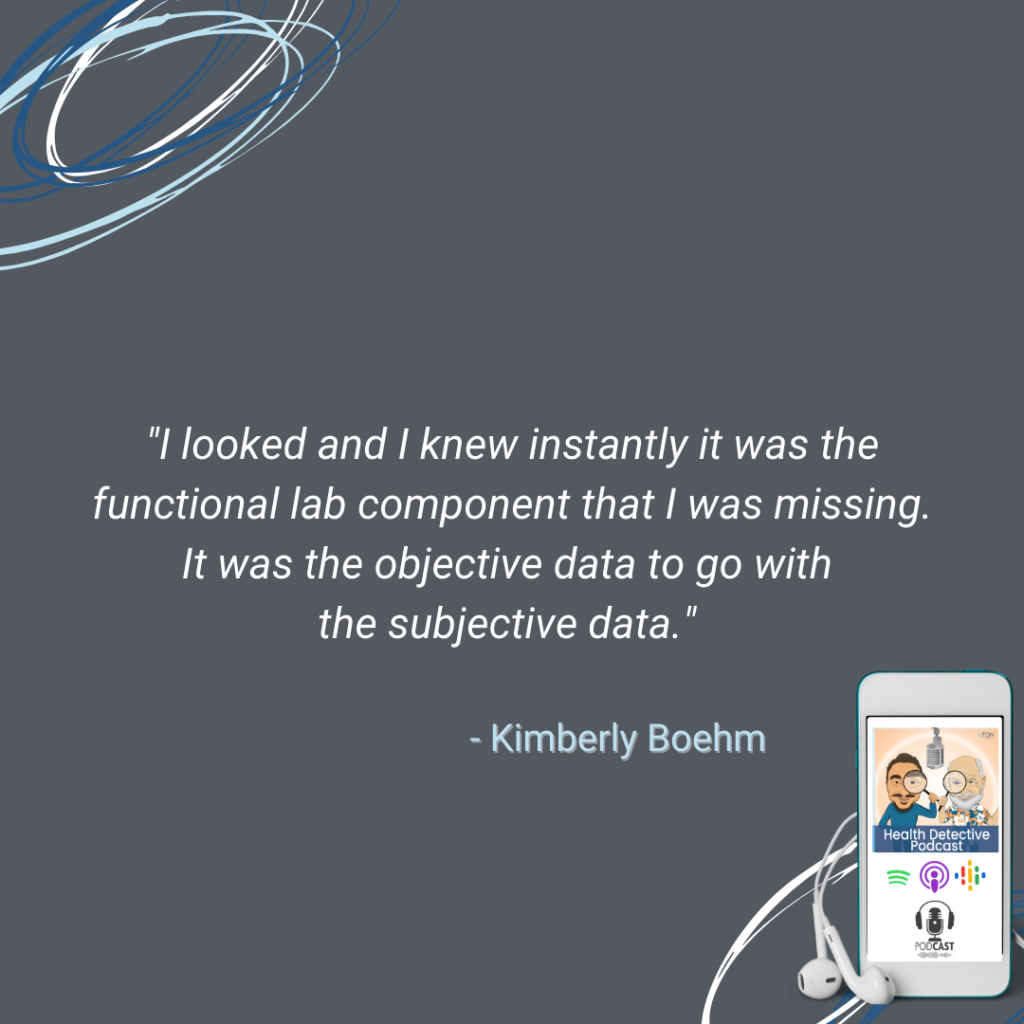
She sent me a link. I looked and I knew instantly it was the functional lab component that I was missing. It was the objective data to go with the subjective data. It was a game changer for being able to create custom protocols for my clients and then coach them. Because what I had been doing, quite honestly, I had been coaching them.
The traditional coaching model is you let your client tell you where they want to go, which is wonderful if they know. But most, they don’t. They’re guessing. They’re guessing at which diet. They’re guessing which form of exercise. You know, guessing which supplement. So FDN is really what was a game changer for me and my success, what I’m doing.
[00:15:27] Detective Ev: As someone who has listed all that stuff, a pretty extensive background in education and very impressive background in education, what did you think about the FDN course? Cause we’re not here claiming that it’s a doctorate level equivalent. But Reed typically says it’s like a master’s level program.
I personally agree with this, but I didn’t go the traditional route in college. So, I can’t really speak on that. Like where would you place this? How did you like the education?
[00:15:49] Kimberly Boehm: Okay. I’m going to be honest with you here. I thought it was incredible. It certainly, not only rivaled, but surpassed some of the more formal education that I’ve actually had. We were taught which labs, how to interpret those labs, and then how to apply them in a practical manner.
FDN Teaches How to Think
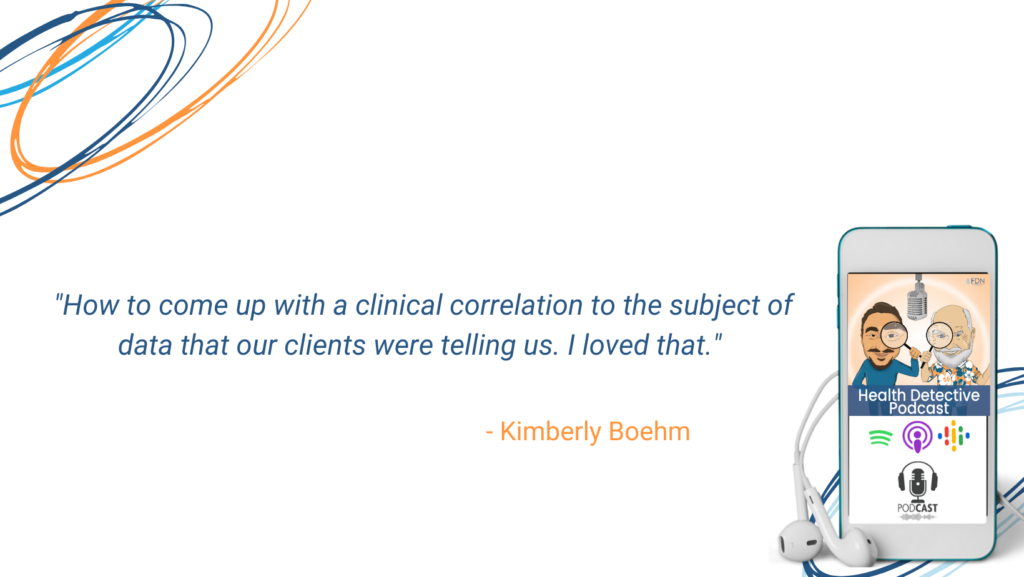
In other words, we were taught not just what to think, we were taught how to think. How to come up with a clinical correlation to the subject of data that our clients were telling us. I loved that.
Rather than just sitting in the classroom where a professor’s going to tell you that this is the answer, and this is what your answer will be. If you say anything other than this, because you think something differently, that’s not going to be the right answer. We’re going to count it wrong. So, I love that. I love that this was something real, you know?
[00:16:41] Detective Ev: Yeah. There’s an audio that I listened to from a guy who passed away like over 50 years ago and he’s not even talking about medicine, Kim. He’s talking just in general, how we’re teaching society what to think instead of how to think.
I love that you said that because FDN, even though we love the labs, it’s a major part of the training. It’s the core part of the training. You could still lose the labs tomorrow. All the labs could get blown up or something like that. We’d still be able to help people really effectively, I would say more so than the majority of practitioners out there.
Not because of any other reason other than we know how to think critically about this. It’s just some of the lines of questioning, even (I’m sure this probably was happening to you before FDN, but now is definitely happening), where we have friends or family members that come up to us. They’re like, well, hey, I have this thing and the doctor couldn’t help. Like, what is it?
FDN Teaches What to Look For
I’m like, okay. I don’t diagnose anything. That’s not what I’m here to do. But I, in two or three questions, am already asking them things that they’ve never been asked before, or they claim that they’ve never been asked before. It’s amazing. I’m considering this and that and that.
I had a person I was talking to the other day. She erupted in a rash like eight, nine months ago, it came out of nowhere. We find out that her husband also had this thing. I’m like, wow, this mystery just keeps getting deeper and deeper. My point is, rather than just try to put a label on that, or guess, that’s not what I do. That’s not what I’m trained in. I know by definition because of FDN, there has to be one or more malfunctions in her brain or body that’s leading to a state of disease. It’s a simple philosophy. But if you truly embody it, it’s actually profound, because the doctors haven’t been able to help her yet.

[00:18:07] Kimberly Boehm: Oh, you’re so right about that. As you know, our founder, Reed Davis, always says, you know, symptoms are the last thing to show up. So, if all you’re doing is treating the symptoms, you’re really letting the underlying cause of that continue in the background. That’s where you continue to see problems.
But you know, the other thing Reed will say all the time, especially all through the training, we don’t treat the paper. Our goal isn’t to look at your blood sugar and decide that we’re going to get it below a seven. Or that your blood pressure should be below this.
FDN Teaches How to Clinically Correlate
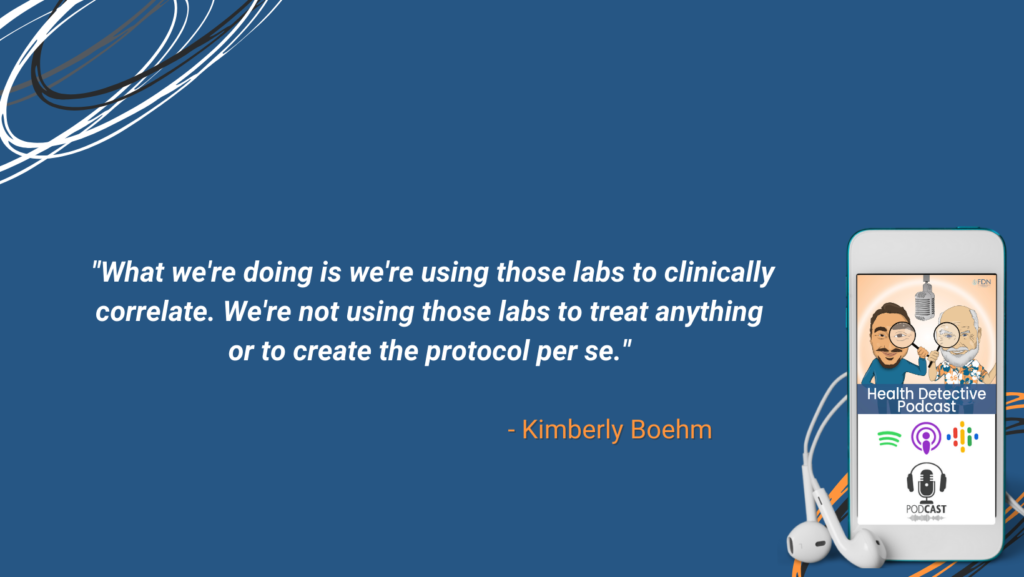
What we’re doing is we’re using those labs to clinically correlate. We’re not using those labs to treat anything or to create the protocol per se. It’s the big picture that we’re looking at, the person, the person, the person, every time.
[00:18:52] Detective Ev: Yeah. Every single time. That’s the cool thing about being an FDN. The system that did diagnose and treat them specifically probably didn’t work. That’s why they’re here. Very few people end up in the FDN world by mistake, especially from a client perspective, are you kidding me? Like that’s never an accident.
As much as I’d love this, we’re just not in a world yet where someone says, the first person I’m going to go to is the FDN. It’s not how it works. So, they’ve been to this system, it hasn’t worked. They need something else, guys. You don’t even want to do that. We have to serve them in a different way.
Now, when you went through the course, cause you’re a pretty healthy person, as it seems, you said. Did you find anything though on your labs that were maybe like healing opportunities, things that you could optimize? Because for those that don’t know, when you go through the FDN course, we actually include multiple labs that we teach you about. You’re going to get to run those labs on yourself and you’re going to get your FDN mentor, or one of the mentors, is going to go over some of those labs with you in a consult.
Did you find anything useful on there, even as someone who was healthy?
FDN Teaches About Metabolic Typing and Food Sensitivities
[00:19:44] Kimberly Boehm: I did. Because I did not come to FDN as some do with my own health issues. You know, Jenn Malecha did with the Hashimoto’s and skin cancer. Once she figured a way to self-treat and cure herself of her own ills, then she became very passionate about it.
That was not how I came to it. When I did my labs in the training, I’d always been very thin. I could always eat people under the table. That was the thing. People just never could believe that I was as thin as I am and ate like I did. But what they didn’t understand is I was hungry all the time, you know, hungry all the time. I never could get from one meal to the next meal.
So, even understanding my metabolic type and that I metabolized things very, very quickly. Carbs, just not enough for me. You know, I really need the protein and the high purine protein at that. That was a game changer for me.

Pulling away food sensitivities. I used to think, well, the more Brussel sprouts I eat, you know, I’m just so much healthier than you. And turn turns out, that’s a red food for me. So, just those basic things, now, I can eat breakfast and can go four or five hours and feel sustained. I don’t get that hangry.
When people would tease me in the past about, oh dude, if she says she’s hungry, I’m just giving you a heads up, you need to feed her. And it was true. It was so true. I hate to admit, but it really was. I don’t have to deal with that anymore.
FDN Teaches to Test, Not Guess
[00:21:00] Detective Ev: I love it. We didn’t actually talk about that when we were at the conference together because that’s very similar to me where I’ve always had that huge appetite. I mean, intentionally trying to gain weight at certain points and wasn’t able to do it.
And what was the narrative, especially for a skinny guy that was like weightlifting, trying to gain weight? Eat more carbs. It was like, literally get your protein and fat. Then if that doesn’t work, you just up the carbs. That’s actually what they teach you. It’s like Broscience, they call it.
So, I got into FDN and yes, I learned about my metabolic type and stuff, a Mixed Oxidizer. But with other things that were going on, I was able to handle more like higher fat, moderate protein things. I ended up having a breakfast, I called it an Ev Shake. It was kind of funny, known to my family and friends. It was pretty interesting stuff. It was about like 70%, 80% fat, you know, maybe 10 grams of carbs total.
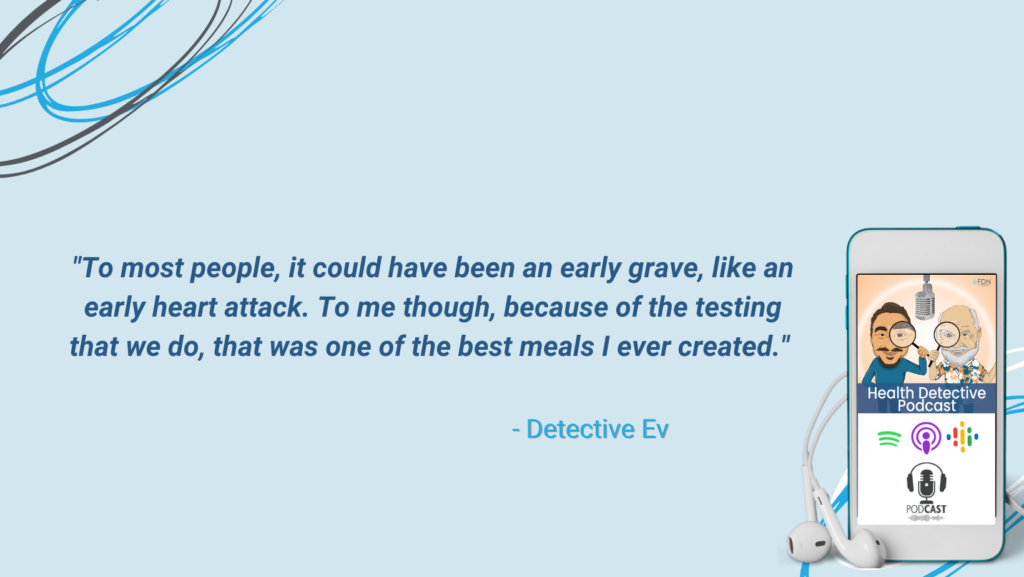
I had never eaten like that. To most people, it could have been an early grave, like an early heart attack. To me though, because of the testing that we do, that was one of the best meals I ever created. It’s highly satiating still to this day. When I have a really long workday, and I know I’m going to be out all day or not have access to like the quality of food that I prefer to have access to, I can take that in the morning. I can have sustained energy for 8 to 10 hours and I’m good to go. Go figure. Right?
Addressing Small Things Now to Avoid Bigger Issues Later
You and I kind of have a similar thing with that where we’re naturally leaner people. You think we can just house through these carbs, but the truth is we needed better energy sources for us. That’s one of the things of many that we teach at FDN, which is cool. for sure.
Also, just seeing my friend, Bry, there, ROOTS Health. She is an FDN. She said, she’s back. This is awesome to do it Live. Cool. We’re glad that you guys like these Live ones. If anyone pops in and has a question for Kim, please feel free to ask Live. We never have had that opportunity on the Health Detective Podcast before. First time for everything. We like being able to do this.
So, you found this stuff when you went through the FDN course, you learned some things on your labs, even for someone, the rare FDN, that comes through this already pretty healthy, there were still opportunities to get better.

The question then becomes, by addressing small things like you did now, maybe you avoided things that would’ve been more of an issue 5 to 10 years down the road from not eating perfectly in alignment with what your body likes. So, who knows? Right?
But either way, what you’ve really thrived at more than anyone else that I know, especially off the bat is getting to the business side of this. Actually being able to help people, charging a reasonable amount for it, amount that they’re okay with, that they want to pay you and that you get to make a living with. I think that’s pretty impressive.
How did you start the FDN business side of things? I don’t know this part. Did you have them lined up before you graduated?
Word of Mouth Marketing Strategy
[00:23:25] Kimberly Boehm: No, I did not. I, like a lot of FDNs, started with guinea pigs of my family, you know, my husband. But I’ll tell you, my husband goes to the gym every day. Every day, five o’clock in the morning, he’s off to the gym. But he’s one of those that he wasn’t losing any weight. He’s six one, he’s 230 pounds. He dropped 50 pounds once we got him on his metabolic type and his food sensitivities. He couldn’t believe it.
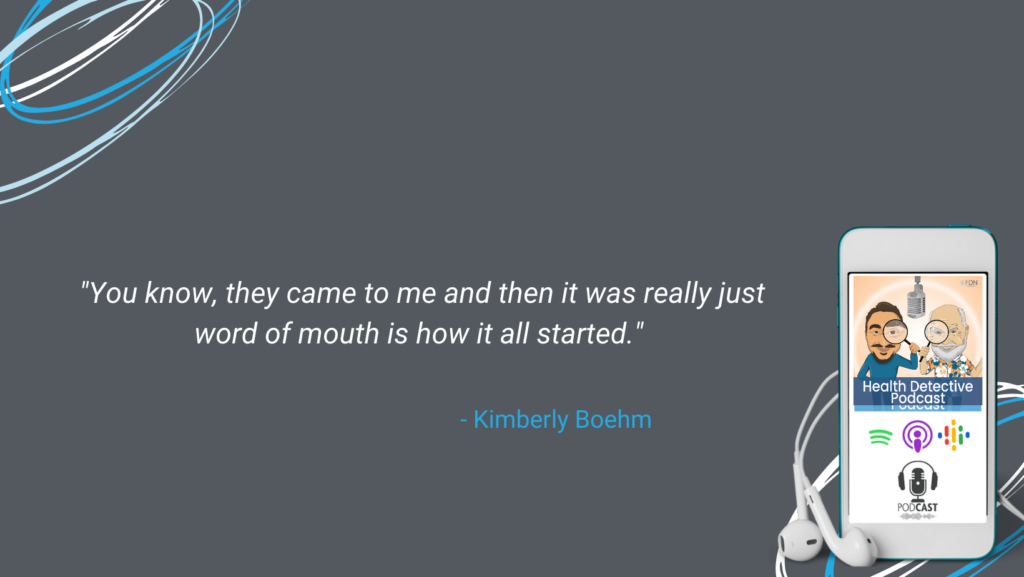
So, of course, all the people at the gym are wanting to know, dude, what did you do? He said, you know, well, my wife is doing this FDN thing. Little by little people started coming to me because they had seen his transformation. My sister had suffered with fibromyalgia for years. I helped my sister and then she told other people at church. You know, they came to me and then it was really just word of mouth is how it all started.
Then I started doing some lectures and going up and down the coast talking. Then it just kind of exploded.
[00:24:17] Detective Ev: The lecture thing is one of the things I wanted to touch on today, for sure, because I get that that’s intimidating for people. People don’t believe me when I say this, but this is the honest to God truth. I hated public speaking. As a kid, it didn’t happen every time, but I have literally thrown up 20 minutes after giving speeches. It’s already done right. The speech is over. And I’m still that nervous that I did that. I dropped out of my community college public speaking course a week and a half in, because I was terrified of that.
Lectures Marketing Strategy
It is a skill that can be taught, learned, and developed. I am the best example of that. You seem to me like a pretty confident person. But either way, it doesn’t matter if you’re there already and you’re confident or you are lacking that. You could build it up and get this.
I do think that lectures and talking to people in groups is some of the best things that you could possibly do. The person in front of the room has the authority. And we have some really great things to say as FDNs.
If someone’s like, how do I get lectures? Like how do I do something like that? You did this so simply that it’s brilliant. How did you go about getting your first lecture?
[00:25:10] Kimberly Boehm: Well, as far as how I book them, I really have to give all the credit to Reed Davis. I would love to say, oh, I did this. I really didn’t do any of it. I purchased the lecture packages right off of the FDN portal there. Once you graduate, you get access to all these fantastic tools with the AFDNP group.

So, Reed already had done all the work. He had the power point presentations, he had survey forms to get people to fill out. He had marketing material to use. All I had to do was put my name on them. He even had it down to phone scripts. Here’s what you’re going to say when you call and ask these people if you can come to their office and speak. Honestly, even a video he had, so I could hear him do it and kind of put it in my own words.
The Duplicatable FDN System
I just took that and was scared to death. I booked my first one and remember thinking, oh goodness, if nobody shows up, I’m still going to do it. I’m going to do it to an empty room. I’m going to practice and make sure that if somebody happens to walk in 10 minutes late, I am still there for them.
I ended up with 12 people my first night and seven out of the 12 actually bought my large package. Then I thought, I love these lectures. I do them over and over and over.
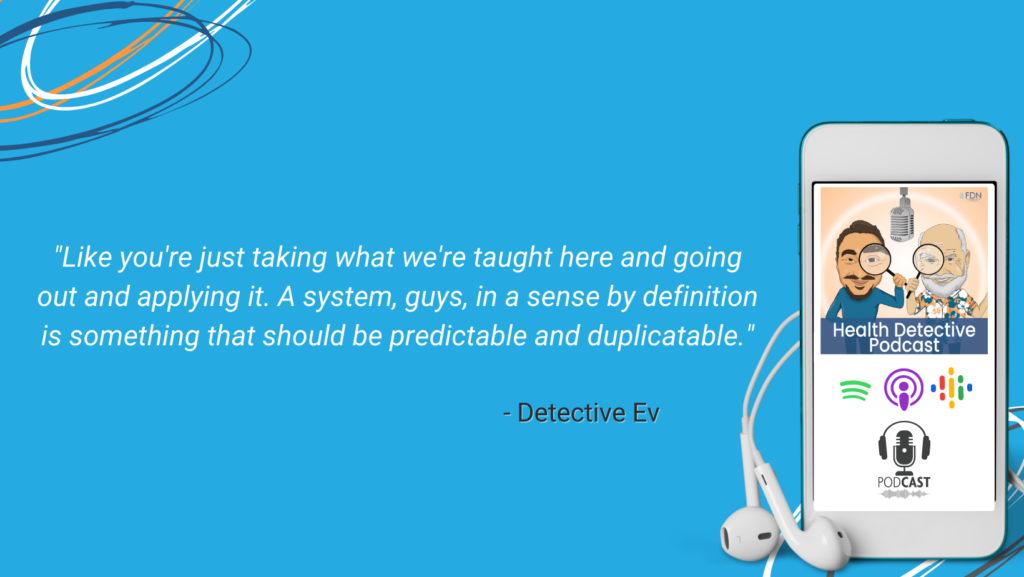
[00:26:17] Detective Ev: And this is my point. Yes, you’re a well-spoken person, educated, confident. I get that. But you’re just using the FDN system. Like you’re just taking what we’re taught here and going out and applying it. A system, guys, in a sense by definition is something that should be predictable and duplicatable. Right? Otherwise, it wouldn’t be a system if it’s different every time and it works sometimes and other times it doesn’t work. That’s not a system, that’s chance.
The FDN system has been done with tens of thousands of people. It is still being refined to perfection to this day. And you don’t need perfection, right? It’s still good enough that anyone can come into this. Even someone that is more shy, introverted, and doesn’t feel like they can go do that stuff and figure this out.
We have the resources for that. I just wanted to emphasize that today because you’re the perfect example of someone who comes in. I’m not going to reinvent the wheel. I’m going to do the education. I’m going to buy the lecture packages, which most people do not do. I give you props for that. Then go do it. And here you are.
Don’t Reinvent the Wheel
I mean, you only graduated how long ago was this? Like a year, or when was it?
[00:27:15] Kimberly Boehm: August will be a year. I’ll tell you, you hit the nail on the head because I love a logical repeatable process with a predictable outcome every single time. You don’t have to buy all of them. I mean, I think he had three, he had four of them already done. So, I ended up buying them all, but not all at one time.

For me, I started in libraries. Once I saw the success I had at one library, it dawned on me, don’t reinvent the wheel. There’re eight libraries in this system here in my county. I’ll just go to the next library and do the same one. And, oh my goodness, I’ll go to the next one. Then when I purchased a second lecture, which was, I think it was, Say Goodnight to Insomnia, I just went back and did the eight-library circuit all over again.
Then I started going to other cities to do them. It was just, yeah, just kind of grew.
[00:27:59] Detective Ev: It’s been happening for years cause Reed was doing that back 10, 15, 20 years ago. Jenn Malecha is the one who got me into FDN. I met her in San Diego. She was giving a lecture from one of the lecture packages right in a coffee shop with like 20 people listening. She got more than she bargained for. She wanted a client, but then I’m still a pain in her butt to this day being involved at FDN. So, a little more than she expected, but you know, it works.
Kimberly Boehm: She is my idol. I just want to be Jenn when I grow up, one day.
Doing FDN Full Time and Growing
[00:28:23] Detective Ev: Actually, that’s kind of interesting that you said that. Cause of all the people I know from the get-go who were already starting a new practice but doing very well, I feel like you guys legitimately are on the exact same page. That’s pretty impressive.
So, I’m not asking for specific numbers, that’s not appropriate, but I am curious. Is this something now, I mean, you’ve only been doing it for a year, I wouldn’t even expect this, but are you able to do this full time or do you need a few more to call it?
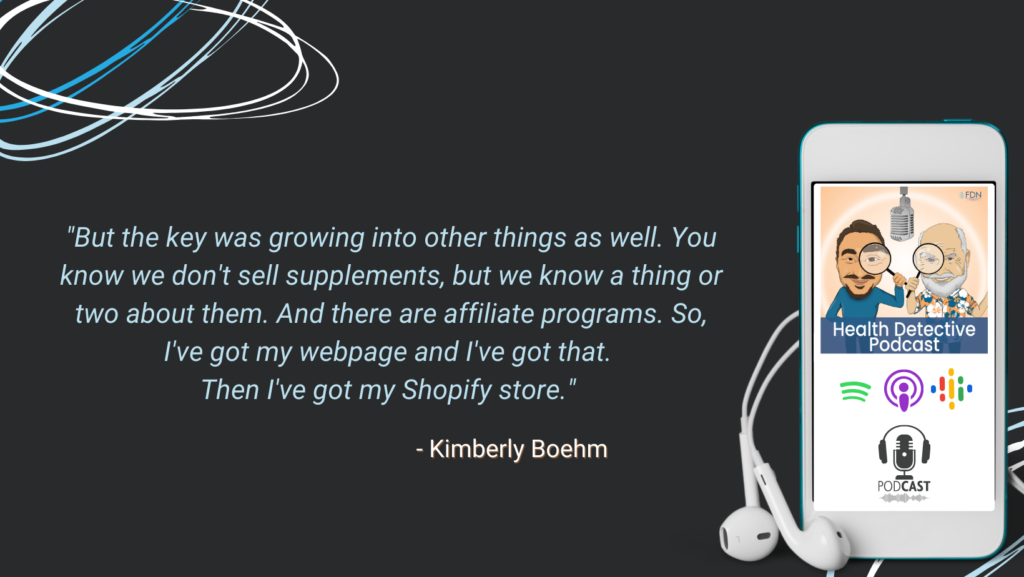
[00:28:45] Kimberly Boehm: Yeah. I do it full time. Yep. And I went from making originally, you know, maybe a couple thousand a month to, I wouldn’t have been enough to sustain. But the key was growing into other things as well. You know we don’t sell supplements, but we know a thing or two about them. And there are affiliate programs. So, I’ve got my webpage and I’ve got that. Then I’ve got my Shopify store.
So, as I work through my protocols, I’ve got things that people can go to and get to help them through, whether it’s exercise equipment or whatnot. But yeah, it was within just a matter of months after starting the lectures, it was well over $10,000 a month and it just keeps growing and growing and growing.
[00:29:20] Detective Ev: Hey, we’re not making claims or guarantees, but it’s happened before. We’ll tell you that’s amazing. You have to do it. You have to do the work.
I’m like mixed in my generation cause like some of my generation believes in not really making money at all and they just wanna give it all away and I think that’s great.
Great Business is Great Pay for Doing Great Work

Then others are kind of the opposite. It’s more of a I’m not going to give to anyone or do anything like that. What if you can do both. That’s my philosophy. I have no problem taking money from someone for something that they wanted me to do for them. That’s a beautiful thing. That’s called great business. You know, they want to be your client. You’re doing a good job. You’re giving them a great result and you get to make kick butt money doing this.
You know, if you do the math too, I never ask anyone’s age, but like you already mentioned at 50, you went back to school. Then did the nursing and now we’re doing this. So, guys, what’s the excuse? You know what I mean? Because Kim, when I was on the course enrollment side, I would have people call in at like 40 and say, is it too late to do FDN? I’m like what?
So, you came in, basically in a two-year span here less than two years, did the course, went out, have done over $10,000 a month, helping other people full-time practice and you didn’t even graduate a year ago. That’s what FDN’s all about. Not reinventing the wheel, going out and talking in libraries.
But you know, of course, there’s going to be someone that’s like, well, my library’s too small. We don’t have any libraries, mine’s out. You know, like there’s always an excuse. But then there’s people that don’t make excuses and they get the results. That’s really incredible. It’s impressive.
[00:30:39] Kimberly Boehm: Yeah, you can do group sessions. You know, you don’t have to just do one on one. You can do group sessions. You can align yourselves with other practitioners.
A Personal Habit Kind of Thing
That was one thing I did too. I aligned myself with some of the other physical therapy companies in town, chiropractors in town. We can go do joint lectures where we both get to speak, and we refer people to each other. But now there’s a lot, you know, there’s work to it too. It’s a business like any other business.
You know, a lot of people do it just to cure themselves actually to self-treat or a family member. But if you’re going to do it as a business, then you need to set it up as a business. You need to run it as a business. You need to have systems of your portal, how you’re going to communicate with people. It’s like anything. Right?
I feel like most people that are successful in life, in business, they could do anything really, because it’s a process. You know, are you willing to do the work? Are you willing to put the time in? Are you willing to do the planning, and putting it on paper, and making sure that you get to those goals?
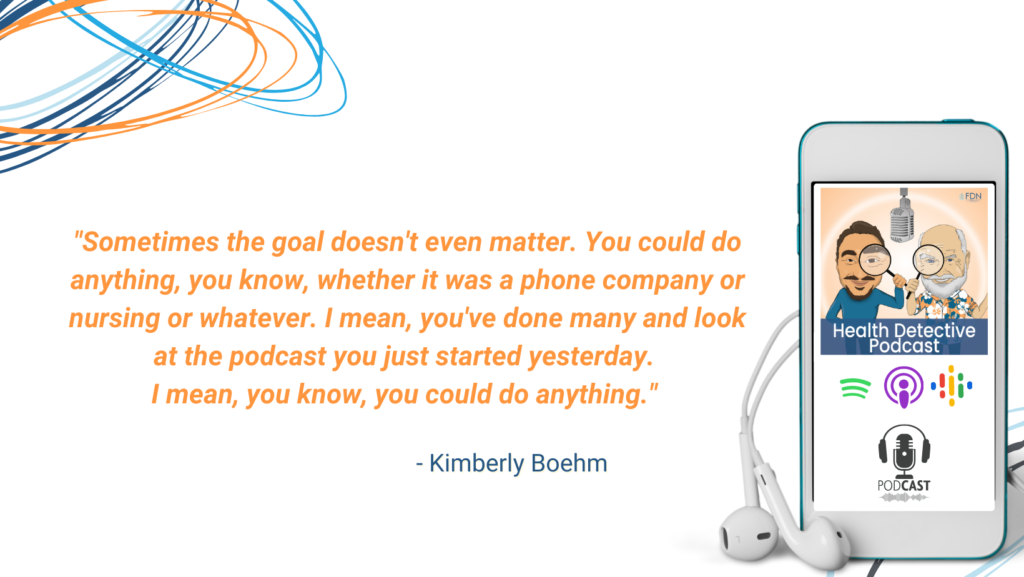
Sometimes the goal doesn’t even matter. You could do anything, you know, whether it was a phone company or nursing or whatever. I mean, you’ve done many and look at the podcast you just started yesterday. I mean, you know, you could do anything. It’s really more of a personal habit kind of thing, I think with people.
The FDN System, A Great Foundation for Anyone
[00:31:53] Detective Ev: I love that you mentioned that aspect of business, the personal habit, personal development. I’m huge into that. It’s interesting that we talked about Jenn Malecha. I have used this example before because she does very well. But the truth is I could put Jenn just about anywhere with anything.
I could put her in real estate. Jenn’s going to go to the top very quickly. It’s not because she’s the smartest. It’s not because she’s the fastest, strongest, whatever it might be. Jenn is a systems genius, first of all. She works hard and she stays consistent, has these habits.
Now, on the opposite extreme, and I’m getting somewhere with this. If I told Jenn tomorrow or you tomorrow, hey you guys have to go out and start selling the thing that my dog puts in the yard (you guys know what I mean), that’s not going to be a great business model, right? Even for the most successful of salespeople, if they have to sell my dog’s waste, that’s not going to work.
I know this sounds funny but hear out what I’m getting at here. That’s hard for even the best, most successful person out there. FDN is not that. FDN is the system that can take someone who is really not great at sales, not good at talking to people, none of that stuff, and you still have a great foundation.

Are you going to do as well as someone like Kim or Jenn? Probably not. But you can always work on yourself. That’s the difference? You don’t have the control as a FDN really to make the system much better, you get what you get. The system’s good. You can get this great baseline just coming in and being yourself.
Sky is the Limit with Personal Development & FDN
But if you want to continue to work on yourself, then you really can, sky’s the limit with this system. Ben Azadi, he’s an FDN. He has literally a top 30 health podcast in America with over 1.5 million downloads now called Keto Kamp. And he’s an FDN. Is everyone in FDN doing that? No, but Ben wants to keep working on himself.
Then you know, Jim Rohn, by any chance, you ever heard of that guy?
Kimberly Boehm: I’ve heard Jim Rohn. Yeah.
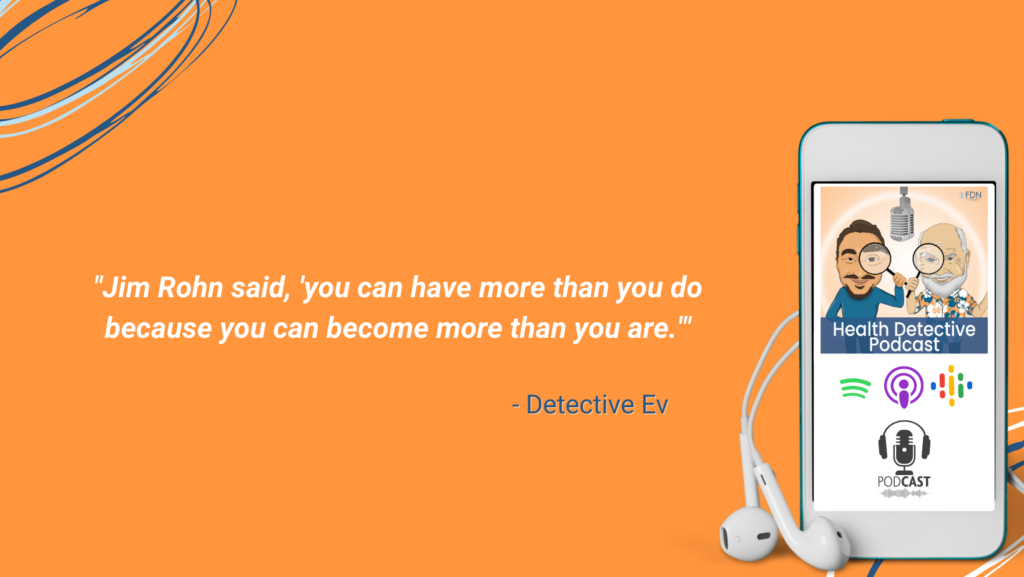
Detective Ev: I love that guy. For those who don’t know, listen to him on YouTube, wonderful personal development guy. He said, you can have more than you do because you can become more than you are. So, you can have more than you do because you can become more than you are. That’s his point. The better that we become, the more that we can serve people. We gotta get that back.
The FDN system is pretty good, even for someone that has no willingness to change, but I would never recommend that, and neither would you. Work on yourself while using this system. To a degree, sky’s pretty much the limit with what you can do here. It’s amazing.
[00:34:02] Kimberly Boehm: I’ll tell you, you’re so right about that. It’s the potential. It is the potential to do as much as you want or don’t want. Because everybody’s goal isn’t to work with however many people a day. Some people are parents that have small children, and they want the flexibility. It’s different things to different people.
Potential and Flexibility to do as Much as You Want
If what you want is to be able to put the kids on the bus in the morning, come home, work a certain block of hours, and then go get the kids at the bus stop and have a life after, it’s that kind of flexibility.

You know, tweak your price, raise your price and work with fewer people. Work from anywhere you want to work from. You go to the beach, you want to work while you’re there a little bit, write off the trip, work from the beach. You want to come home? That to me is, there’s freedom. It’s not just financial freedom because money is not everything. But you ought to be able to make a good living doing it. And you certainly can.
[00:34:55] Detective Ev: Earl Knightingail said, (he’s another personal development figure for those who don’t know), he said, most people actually don’t need as much money as they think that they do. And that’s not to sell yourself short. But the point is, we all think (especially when we’re younger), oh, I need a billion dollars or all this stuff. No, you don’t. You need enough money to do the things that you want to do.
Quite frankly, it’s probably not going to cost anywhere near a billion dollars or even a hundred million. You don’t need anything close to that. And you want to not hate your life. You want to engage in activities on a daily basis that are actually enjoyable. What’s amazing is the more that second option is up, like the enjoyment of life, the less you actually need here. Now, I am all for enhancing both of these as high as possible. I still try to enhance both those every day.
More Than You Need Is More Than You Need
But I’ll tell you this, like for myself and yourself, like when I’m going to meetings on a daily basis or speaking gig or whatever, I’m not working as far as I’m concerned. I got to rest. Like yes, there’s a physical toll, but it’s not working in the sense of, oh my God, I can’t, I got to clock in today. This is going to suck.
The health benefits of just that is probably better than any diet out there, just not hating your life. Because so many people are not thrilled with what they’re doing, unfortunately. So, it’s cool to be able to do what we love.
[00:35:59] Kimberly Boehm: Well, it is. And I forget even who it was, I heard say this once, but it was a aha moment for me. They said, you know, more than you need is more than you need.
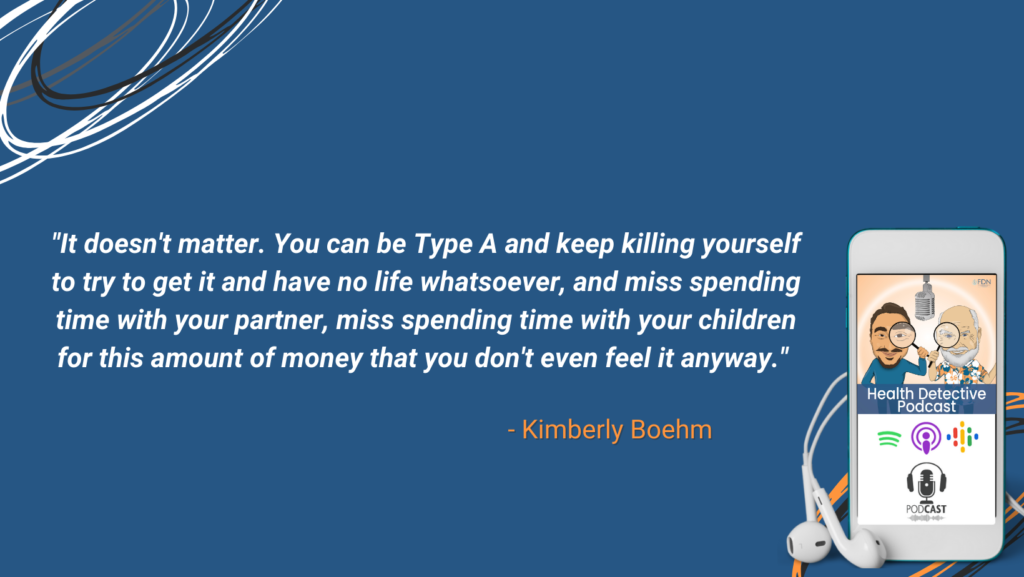
It doesn’t matter whether you have this much more than you need, or millions more than you need. When you have more than you need, you quit feeling the difference. It doesn’t matter. You can be Type A and keep killing yourself to try to get it and have no life whatsoever, and miss spending time with your partner, miss spending time with your children for this amount of money that you don’t even feel it anyway.
You need what you need, but to be happy and healthy and balanced and doing what you love to do is the name of the game. I really have to say that of anything I’ve ever done, FDN suits me and the lifestyle I want to lead much better than anything else I’ve ever done.
Successful Client Story
[00:36:50] Detective Ev: Awesome. All right, Kim, I got a few more questions for you to wrap up. One, because I know that you talked about your husband and I believe sister with the fibromyalgia, correct?
Kimberly Boehm: Yeah.
Detective Ev: Alright, cool. Well, you have a full-time practice. You’re obviously doing the work. To the degree that you’re able to share for privacy reasons, what is one of like the coolest client testimonials or stories that you’ve seen so far for people that have worked with you? Maybe someone that was at the end of their rope, they felt like there’s no other option, came to you and got some outcomes.
[00:37:13] Kimberly Boehm: Yeah, I would have to say one of the ones that really sticks out to me was a student at Embry-Riddle in the aeronautic program. Brilliant, brilliant young woman with migraines and digestive issues that really just kind of kept her from living her best life there at campus.
It kept her from participating in a lot of classroom activity. She had just seen honestly, seven or eight different people. She was just at her rope’s end and just thought, I’m not going to be able to keep doing this. I’m not going to make it through school.

Within a month, she was off of several different medications that she had been taking, not at my direction, because we don’t tell people to stop taking their medicine. But as she didn’t need medication for depression anymore, she came off that. A whole symptom bucket of things went away when she quit taking that medicine and then the migraine medicine. You know, you start adding medicines on top of medicines and you start kind of creating your own problem as well.
Helping Others, Why We Do What We Do
So, the bang you got for your buck just by getting you on the right diet, keeping those histamine foods low, food sensitivities, it was life changing. She came running up to me at church and my husband, again, 6’1″ big guy. I look over at him, he’s got tears coming down his face cause this little young girl comes running up to me and throws her arms around me.
She says, oh Ms. Kim, you won’t believe it. You just won’t believe it. I’m going to class and I’m participating. She was so excited and he’s just over there bawling. But it was just, it was a moment, you know. It was like, this is why I do it. This is why I do it. There’s no telling what that young girl will go on to achieve, just by being her best self.
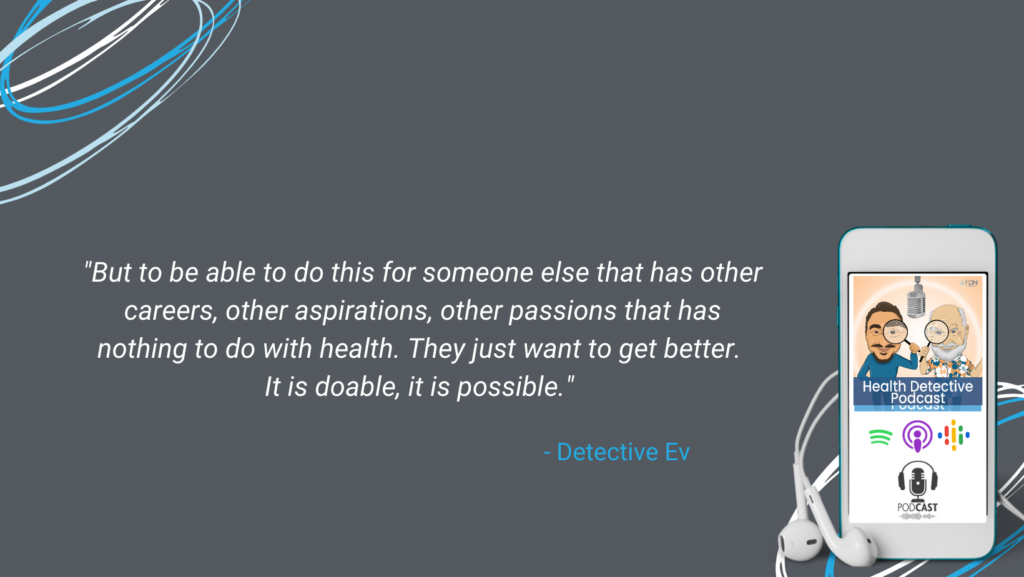
[00:38:52] Detective Ev: It’s one of my favorite questions to ask FDNs on the podcast. I always say, it’s one thing to get the results for ourselves. Maybe we’re a different breed, we’re discipline people, whatever. But to be able to do this for someone else that has other careers, other aspirations, other passions that has nothing to do with health. They just want to get better. It is doable, it is possible. There’s thousands of clients doing it right now, amongst all the FDNs as we speak.
You guys can really have an opportunity to do work that not many people have the privilege of being able to do with the FDN programs. That’s amazing.
Okay. One other thing, Kim. Obviously, because we’re talking about the course today, we’re hyping up the course, cause it’s a great thing.
Who Are Kim’s Target Clients?
At the same time, occasionally people are following us or listening because they’d like to work with someone. Maybe they’ve listened to this Instagram Live or the podcast version. Which, by the way guys, search for The Health Detective Podcast on Apple. We have over 150 episodes now with interviews from all types of FDNs and functional practitioners. You guys will love it. Kim’s will be out two from now, basically. I’ll get it uploaded there.
But who do you work with? Like, do you have a specific type of person, maybe conditions or whatever. Now, FDN, of course, addresses everything, but some people just like to work with certain conditions cause they can empathize with it better, whatever it might be.

[00:40:00] Kimberly Boehm: Yeah. I would have to say that just by way of the lectures, most of the folks that I work with (because they are attendees that have come to the lecture), it’s fibromyalgia, it’s stress and hormone imbalance, it’s insomnia, ADHD. Again, because they’ve come to the lecture.
But what happens after that is you get people who maybe came to see me for stress and hormone issues who happened to lose 30 or 40 pounds. Then somebody will want to come see me just because, I saw that she lost all this weight, and she really didn’t even have to do anything. She just changed her diet and then whatever. Then it’s just kind of word of mouth. But my core is probably people that come off of those lectures, honestly.
Where to Find Kim Boehm
[00:40:36] Detective Ev: Okay. That’s amazing that you said that because word of mouth, I think. Listen, everyone’s going to have to start in the beginning, right? You’re going to have to work a little bit to get things going. The top FDNs that I know universally are getting more clients off referrals or word of mouth stuff at that point than they are anything else. Really, really cool stuff.
So, where can people find you if they’re interested in working with you? Maybe they’re one of those people that have those things.
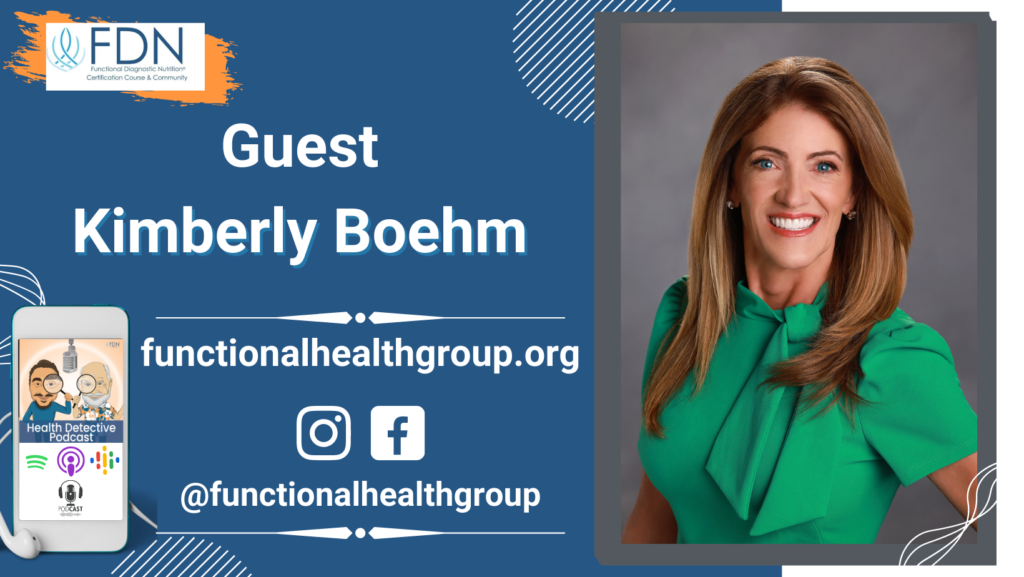
[00:40:58] Kimberly Boehm: Yeah. If they want to, they can find me. My webpage is functionalhealthgroup.org, and I’m also on LinkedIn. I’m on Instagram, and Facebook. You can find me on any of those social medias. But yeah, you can book free consultations with me right off of my webpage, which is functionalhealthgroup.org.
Health Detective Podcast Signature Question
[00:41:14] Detective Ev: If you guys have any last second questions for Kim, hurry up and drop them in the comments below. I’ll ask him to her Live. But I do have one more question for you if no one else has one.
It’s our signature question on the Health Detective Podcast. What I will ask you is, if in this case, I could give Kim a magic wand and you could get every single person in this world to do one thing for their health, whether that’s literally do one thing or stop doing one thing, what’s the one thing you’d get them to do?
[00:41:39] Kimberly Boehm: Go outside. If you go outside, you’re going to get fresh air. You’re going to get sunlight. You’re going to get the grounding of the earth. You know, something somebody told me the other day is I really don’t need to be out in the earth. What does that have to do with anything?
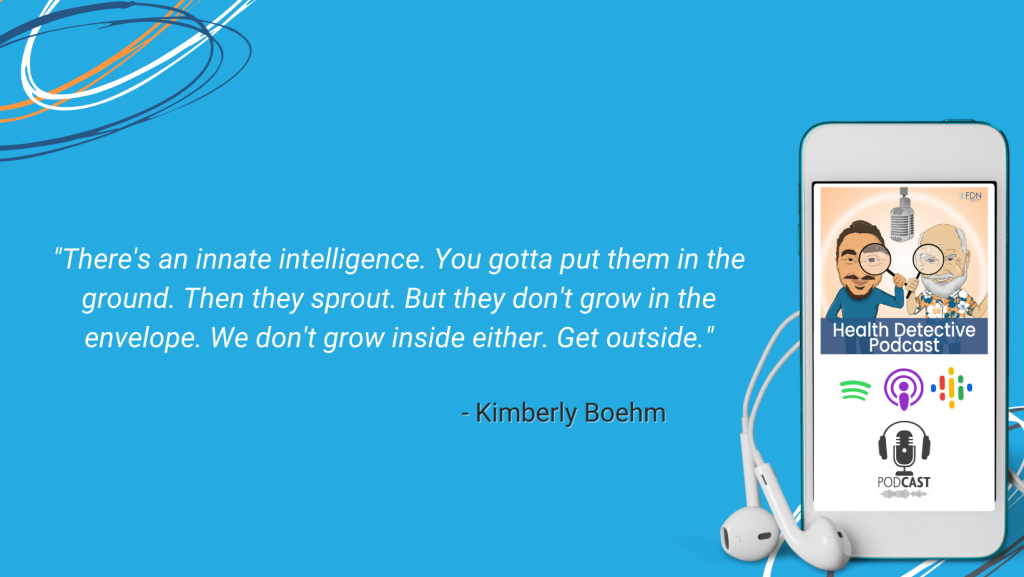
I said, you know, when was the last time you bought seeds in an envelope that grew in the envelope? They don’t. There’s an innate intelligence. You gotta put them in the ground. Then they sprout. But they don’t grow in the envelope. We don’t grow inside either. Get outside.
You can always visit FDN at functionaldiagnosticnutrition.com.

